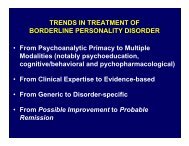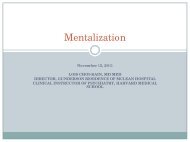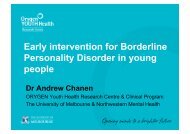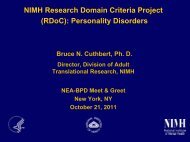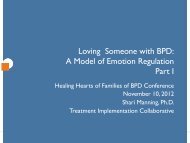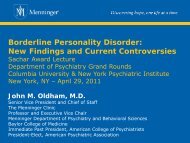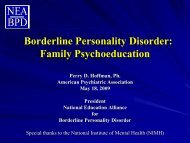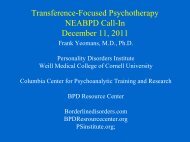A BPD Brief - Borderline Personality Disorder
A BPD Brief - Borderline Personality Disorder
A BPD Brief - Borderline Personality Disorder
You also want an ePaper? Increase the reach of your titles
YUMPU automatically turns print PDFs into web optimized ePapers that Google loves.
___________________________________________________________________________ 10the ability of the patient to have relationships of this nature with others. Validation, including beinglistened to, helps individuals develop recognition and acceptance of their self as unique and worthy.Multiple forms of psychotherapy have been shown by research to be effective. All of them decreaseself-harm, suicidality, and use of hospitals, emergency rooms, and medications. The best knownand most widely practiced of the empirically validated therapies is Dialectical Behavior Therapy(DBT). It combines individual and group therapy modalities and is directed at teaching the borderlinepatient skills to regulate intense emotional states and to diminish self-destructive behaviors. DBTincludes the concept of mindfulness, including self-awareness and balancing cognitive andemotional states, resulting in “wise mind.” DBT also emphasizes regulating emotions; distresstolerance skills and effective interpersonal skills. This therapy’s proactive, problem-solving approachreadily engages borderline patients who are motivated to change.Two of the effective therapies for <strong>BPD</strong> are psychodynamic (aka psychoanalytic). Transferencefocused psychotherapy (TFP) is a twice-weekly individual psychotherapy that emphasizes theinterpretation of the meaning for the patient’s behaviors within relationships, most notably therelationship with the therapist. TFP also emphasizes the importance of experiences of anger.Mentalization based therapy (MBT) combines individual and group therapy. It emphasizes learningto recognize one’s own mental states (feelings/attitudes) and those of others as ways of explainingbehaviors. This capability is called mentalizing, and is a capacity that all effective therapies try toenhance.General Psychiatric Management (GPM) is a once-weekly therapy that can include prescribingmedications and family interventions as needed. The therapy tries to create a “containingenvironment” within which patients can learn to trust and feel. This therapy requires clinicalexperience, but is the least theory-bound and easiest to learn of the empirically validated therapies.C. PharmacotherapySelective serotonin reuptake inhibitors and other antidepressants have frequently been prescribed topatients with <strong>BPD</strong>, but they are only modestly useful. Randomized controlled trials now suggest thatatypical antipsychotics or mood stabilizers may be better choices. These studies also show that notype of medication is consistently or dramatically effective. Benzodiazepines are the one class ofmedications shown to make patients worse, though even here, there are exceptions. Thusmedications should be initiated with the full understanding by the borderline patient that they have anadjunctive role to psychotherapy in treatment. In practice, prescribing medications may help tofacilitate a positive alliance by concretely demonstrating the physician’s wish to help the borderlinepatient feel better; but unrealistic expectations of the benefits of medication can undermine work onself-improvement.Common concerns when prescribing medication to these patients include risks of overdosing andnon-compliance, but experience suggests that medications can be used with much reduced risk aslong as a patient is regularly seeing and communicating with his or her provider. Another commonproblem in practice is polypharmacy, which may occur when patients want to continue or addmedications despite a lack of demonstrable benefit; eighty percent of borderline patients are takingthree or more medications. Consequences include side effects such as obesity (especially withantipsychotic agents) and associated problems such as hypertension and diabetes. When the benefitof a medication is unclear, patients should be urged to discontinue it before initiating a new one.____________________________________________________________________________A <strong>BPD</strong> <strong>Brief</strong>: Revised 2011







